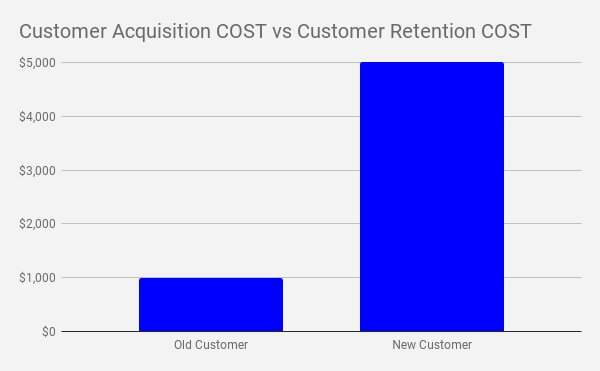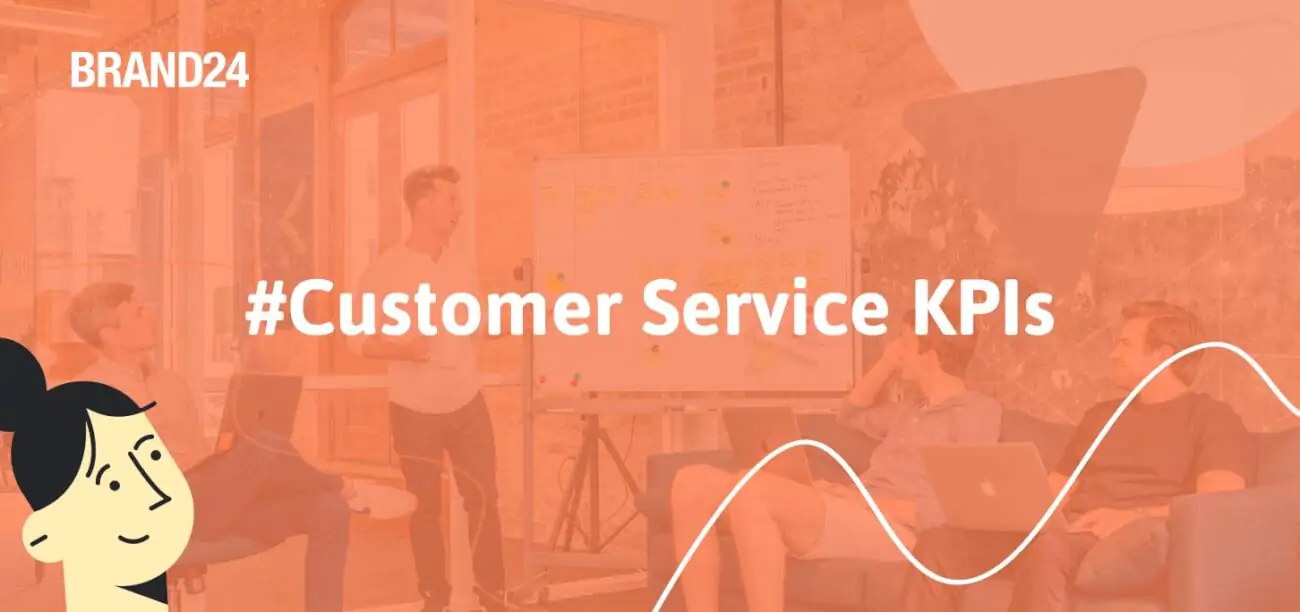Customer Engagement Strategies 3: Provide Customer SERVICE, Not Sales
Customer engagement strategies 3: provide customer SERVICE, not sales
Customer engagement strategies are about building relationships with your customers
Especially when it comes to customer service (and I mean real customer service that’s about helping your customers and not just selling to them).
Helpful customer engagement that provides real customer service is key to increasing customer loyalty for your business, so your new customers become repeat customers.
Remember: It costs 5X more to acquire a new customer than it does to retain an existing one.

And the most important part of building loyal customer relationships (or any kind of relationships)?
Trust.
Customer engagement strategies: building trust
Trust is created once your audience starts to see you as a reliable source – a source who appreciates the needs of others and who isn’t just focused on their own self-interest. (Like, well, a person.)
I’m not a cynic.
I believe in the inherent goodness of people.
But I’ve also seen the spellbinding power of blind ambition.
Luckily, this usually isn’t permanent and can be easily remedied with a quick self-evaluation. Consider these points:
- Is your communication with your audience and customers 1-way?
- Does it include a few topics, or just one?
- Do you spend more time creating posts about your product rather than going directly to your most valuable resource and engaging with your audience to learn what they think?
These points are all based on listening, and there’s a good reason why.
Good listening, the active and disciplined activity of probing and challenging the information garnered from others to improve its quality and quantity – is the key to building a base of knowledge that generates fresh insights and ideas. Put more strongly, good listening, in my experience, can often mean the difference between success and failure in business ventures (and hence between a longer career and a shorter one).
-Bernard Ferrari, Dean of Carey Business School of Johns Hopkins University
From C-suite executives to sales teams and marketing departments, listening skills are considered to be the most critical skill to master in business.
Of course, in terms of customer engagement, this starts with being active on social media in the first place and actively building brand presence.
Here are a few tips for building social media presence for businesses.
However, if all you do on social media is promote your product, you might get some attention, but you won’t win much trust. In fact, your audience will assume that everything you say and do is motivated by getting them to spend their hard-earned money on your product. And, well, they wouldn’t be wrong, would they?
There’s nothing wrong with wanting to do your job and make sales, but if all you do is pitch your product, you’ll find yourself banging your head against the wall in frustration.
How to avoid: if you want to sell (and keep selling to loyal repeat customers), you need to STOP selling.
In other words, make sales a background priority – something that’s always there, but part of the background, not in the spotlight.
Instead, prioritize your customers by listening to them.
Customer engagement strategies: LISTEN
Remove the focus from yourself and your own monthly goals and start paying attention to what your customers are looking for. Be interested in really offering assistance and providing helpful customer SERVICE, whether it’s with your product or not. If you think about it, it’s all just part of being a better person, which is a valuable way of spending your time. It’s also coincidentally what will help you build loyal customer relationships.
By listening, and I mean truly listening, you’ll find that your customers are asking questions like this:
‘How can I solve this problem?’
And they’re NOT asking questions like this:
‘How can I use your product/service to solve this problem?’
But you don’t want to give up on any opportunity to generate potential leads for your company, you say?
Sure, that’s understandable, and I admire your enthusiasm. But let’s not go crazy.
Recommend your product to a customer only if you feel that it is something that is truly appropriate to their needs and the situation at hand.
May we recommend a treat from our Old Fashioned Soda Fountain? Perhaps a Rootbeer Float? Chocolate Shake? Or LemonLime Phosphate? #MWTravel pic.twitter.com/tVZ9JA6lU4
— The Durham Museum (@TheDurhamMuseum) November 1, 2017
Appropriate recommendations are helpful and appreciated by your audience. Like this:
Never can pass up a Chocolate Shake! And for some reason I crave ice cream when it gets cold?! #MWTravel @VisitOmaha
— Dave & Angela (@DangTravelers) November 1, 2017
Yum! I love the ambiance of sitting at that countertop and people watching too! #MWTravel #OmahaWeekend
— Greta PicklesTravel (@PicklesTravel) November 1, 2017
Be genuine.
If you have any helpful tips, let your customers know about them
Listening and being helpful aren’t just attributes that will ultimately improve the quality of your life and those you interact with, they’re also integral parts of a good customer engagement strategy. While some patience is required and you won’t necessarily reap immediate benefits, they’re key to building trust and creating loyal customer relationships of much greater value.
Malmo, Sweden does a great job at listening to their audience and helping out potential tourists on Twitter:

Do you see what I see?
The most impressive part of @Malmotown’s reponse is that they were able to find Hannah’s Tweet in the first place.
Notice that Hannah only mentions the town of Malmo in her Tweet, and does not direct her message at @Malmotown or even include a hashtag.
Since they were not tagged in the message, we know that @Malmotown didn’t receive any notifications from Twitter about the message. This means that they found Hannah’s Tweet via social listening.
In order to be helpful, first you have to know when and where your audience needs help.
When your customers have questions that you can answer, but you’re not tagged in the question – social listening tools can alert you to this opportunity.
As you can see, customers appreciate when you listen and pay attention to their needs. Especially when you offer helpful solutions (not just waiting for the right moment to interject with ‘have you considered Product X?’ Save that for the Chatbots – that’s their job, not yours).
Plus, if the solutions that you suggest are other products from other companies – those companies will notice (you know they’re monitoring their own brands with social listening) and you’ll find yourself making friends and business allies everywhere.
Great hotel. We recommend this hotel to our colleagues and they like staying there. Friendly staff!
— Cameron Surgical (@cameronsurgical) November 2, 2017
Karma can either deliver a swift kick to the butt, or it can be a hand that helps you up – you decide.
It’s all part of building relationships – with your customers AND with other businesses.
Practice meaningful customer engagement strategies with real customer SERVICE
This is about knowing where your customers are and being there. The Internet is vast. It’s hard to be everywhere at once and catch each opportunity (like @Malmotown), especially with all the different ways that your customers could be reaching out to you or just talking about you (on review sites, in comments on social content, on personal blogs, in the comments section on those blogs, in media stories, in personal posts on social media, in discussion forums, etc… the list goes on).
Tools for social listening simplify the process with automation. They scour the web to find relevant mentions for you, so you can focus on learning from them and engaging them.
All you need to do is select the keywords or phrases that you want to monitor. Then, create a project for social listening, and a tool like Brand24 will retrieve and monitor mentions of your keywords and phrases across the web.
For starters, you can monitor your company, your competitor (you may be able to help some neglected customers), your product, similar products, and key industry terms. For more in-depth monitoring, add these keywords to your project:
8 keywords your business should be monitoring on-line that are NOT your brand name
When you’ve found a few opportunities where you can practice meaningful customer engagement strategies, remember the tips from above:
- Do put your customer’s needs above your monthly sales goals
- Do practice active listening with your customers
- Do make helpful suggestions
- DON’T just pitch your product
If there’s one piece of helpful advice that I hope sticks with you after reading this post, it would be this:
Engage with the intent to truly help your customers.
This means really listening to provide REAL CUSTOMER SERVICE that your customers need. Your customers chose your company once. Show them how much you appreciate this by listening to them and helping them, instead of blindly selling to them. Let them know you’re a source they can trust and create loyal (customer) relationships that last.
Related articles



